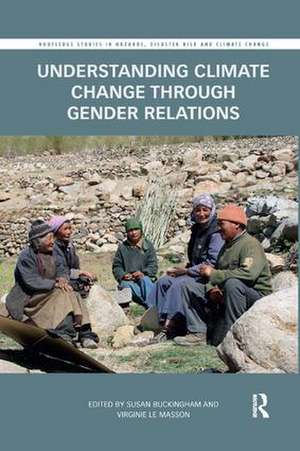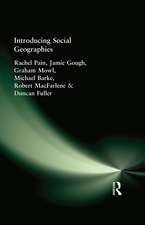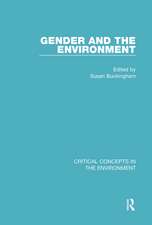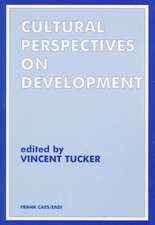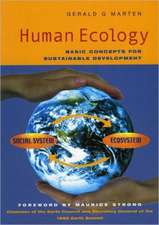Understanding Climate Change through Gender Relations: Routledge Studies in Hazards, Disaster Risk and Climate Change
Editat de Susan Buckingham, Virginie Le Massonen Limba Engleză Paperback – 17 ian 2019
This book will be of interest to students, scholars, practitioners and policymakers interested in climate change, environmental science, geography, politics and gender studies.
| Toate formatele și edițiile | Preț | Express |
|---|---|---|
| Paperback (1) | 420.76 lei 6-8 săpt. | |
| Taylor & Francis – 17 ian 2019 | 420.76 lei 6-8 săpt. | |
| Hardback (1) | 1005.34 lei 6-8 săpt. | |
| Taylor & Francis – 10 mai 2017 | 1005.34 lei 6-8 săpt. |
Din seria Routledge Studies in Hazards, Disaster Risk and Climate Change
-
 Preț: 287.87 lei
Preț: 287.87 lei -
 Preț: 311.41 lei
Preț: 311.41 lei - 9%
 Preț: 934.96 lei
Preț: 934.96 lei -
 Preț: 153.08 lei
Preț: 153.08 lei -
 Preț: 296.85 lei
Preț: 296.85 lei -
 Preț: 278.13 lei
Preț: 278.13 lei -
 Preț: 465.39 lei
Preț: 465.39 lei -
 Preț: 389.66 lei
Preț: 389.66 lei - 21%
 Preț: 138.22 lei
Preț: 138.22 lei -
 Preț: 384.86 lei
Preț: 384.86 lei -
 Preț: 413.33 lei
Preț: 413.33 lei -
 Preț: 389.66 lei
Preț: 389.66 lei -
 Preț: 385.62 lei
Preț: 385.62 lei - 18%
 Preț: 1000.89 lei
Preț: 1000.89 lei - 18%
 Preț: 893.58 lei
Preț: 893.58 lei -
 Preț: 416.22 lei
Preț: 416.22 lei -
 Preț: 389.38 lei
Preț: 389.38 lei - 18%
 Preț: 1002.02 lei
Preț: 1002.02 lei - 17%
 Preț: 272.50 lei
Preț: 272.50 lei -
 Preț: 385.08 lei
Preț: 385.08 lei - 18%
 Preț: 1002.60 lei
Preț: 1002.60 lei -
 Preț: 385.02 lei
Preț: 385.02 lei -
 Preț: 400.10 lei
Preț: 400.10 lei - 18%
 Preț: 272.06 lei
Preț: 272.06 lei -
 Preț: 453.53 lei
Preț: 453.53 lei -
 Preț: 286.20 lei
Preț: 286.20 lei -
 Preț: 383.17 lei
Preț: 383.17 lei - 18%
 Preț: 1001.84 lei
Preț: 1001.84 lei - 15%
 Preț: 475.62 lei
Preț: 475.62 lei - 18%
 Preț: 895.32 lei
Preț: 895.32 lei - 17%
 Preț: 272.64 lei
Preț: 272.64 lei
Preț: 420.76 lei
Nou
Puncte Express: 631
Preț estimativ în valută:
80.54€ • 87.51$ • 67.70£
80.54€ • 87.51$ • 67.70£
Carte tipărită la comandă
Livrare economică 21 aprilie-05 mai
Preluare comenzi: 021 569.72.76
Specificații
ISBN-13: 9780367218881
ISBN-10: 0367218887
Pagini: 224
Dimensiuni: 156 x 234 x 18 mm
Greutate: 0.56 kg
Ediția:1
Editura: Taylor & Francis
Colecția Routledge
Seria Routledge Studies in Hazards, Disaster Risk and Climate Change
Locul publicării:Oxford, United Kingdom
ISBN-10: 0367218887
Pagini: 224
Dimensiuni: 156 x 234 x 18 mm
Greutate: 0.56 kg
Ediția:1
Editura: Taylor & Francis
Colecția Routledge
Seria Routledge Studies in Hazards, Disaster Risk and Climate Change
Locul publicării:Oxford, United Kingdom
Public țintă
Postgraduate and UndergraduateCuprins
1. Introduction Part 1: Structures 2. Moving beyond impacts: more answers to the ‘gender and climate change’ question 3. Integrating gender issues into the global climate change regime 4. Gender justice and climate justice: building women’s economic and political agency through global partnerships 5. Gender and urban climate change policy: tackling crosscutting issues towards equitable, sustainable cities 6. Natures of masculinities: conceptualising industrial, ecomodern and ecological masculinities 7. The contribution of feminist perspectives to climate governance Part 2: Case studies 8. Gender, climate change and energy access in developing countries: state of the art 9. Everyday life in rural Bangladesh: understanding gender relations in the context of climate change 10. Investigating the gender inequality and climate change nexus in China 11. Revealing the patriarchal sides of climate change adaptation through intersectionality: a case study from Nicaragua 12 Safeguarding gender in REDD+: refl ecting on Mexico’s institutional (in)capacities 13 ‘Women and men are equal so there is no need to develop different projects’: assuming gender equality in development and climate-related projects 14. Co- housing: a double shift in roles? 15. Integrating gender and planning towards climate change response: theorising from the Swedish case 16. A gender- sensitive analysis of spatial planning instruments related to the management of natural hazards in Austria
Recenzii
" Understanding Climate Change Through Gender Relations provides enlightening and accessible perspectives about the necessity of addressing gender relations within the context of climate change. Not explicitly a work of ecofeminism, the content and arguments will be of no surprise to those familiar with ecofeminism, as both the theoretical essays and case studies are broadly informed by ecofeminist principles of care, equity, intersectionality, and justice for both the planet and humanity equally. Understanding Climate Change Through Gender Relations thoroughly indicates the necessity of engagement with feminist environmental thought both theoretically and pragmatically if we are to save humanity and the planet." - Sarah O'Brien, Drew Theological School, Madison, USA
"The intersectional and post-colonial-feminist anthology Understanding Climate Change through Gender Relations represents a refreshing and militant commitment to the realization of the humane side of climate change. Overall, the anthology provides a compelling variety of theoretical and empirical contributions and is enlightening beyond the boundaries of climate change research. The gender perspective and an intersectional, post-colonial-feminist claim are confidently maintained in all texts and in this way illuminate the humane dimension of changes in the climate in terms of dominance and power." - Sahra Dornick, Research Associate at the Center for Interdisciplinary Women and Gender Studies (ZIFG), Berlin
"The intersectional and post-colonial-feminist anthology Understanding Climate Change through Gender Relations represents a refreshing and militant commitment to the realization of the humane side of climate change. Overall, the anthology provides a compelling variety of theoretical and empirical contributions and is enlightening beyond the boundaries of climate change research. The gender perspective and an intersectional, post-colonial-feminist claim are confidently maintained in all texts and in this way illuminate the humane dimension of changes in the climate in terms of dominance and power." - Sahra Dornick, Research Associate at the Center for Interdisciplinary Women and Gender Studies (ZIFG), Berlin
Descriere
Attempts to understand the production and impacts of climate change and proposals for mitigation and adaptation through gender analyses are thin on the ground. This book explains how gender, as a power relationship, influences climate change related strategies and considers the additional pressure that climate change puts on uneven gender relati
